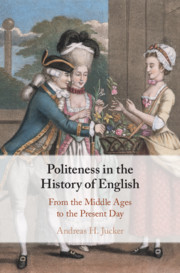Book contents
- Politeness in the History of English
- Politeness in the History of English
- Copyright page
- Contents
- Figures
- Tables
- Preface
- 1 Exploring Politeness in the History of English
- 2 Research Methods and Data Problems
- 3 Medieval Britain
- 4 Terms of Address in Middle English
- 5 Renaissance and Early Modern England
- 6 Terms of Address in Early Modern English
- 7 The Eighteenth Century: The Age of Politeness
- 8 The Eighteenth Century: Educational Literature
- 9 The Rise (and Fall) of Non-imposition Politeness
- 10 Conclusion: Politeness, Manners and Dissimulation
- References
- Index
6 - Terms of Address in Early Modern English
Published online by Cambridge University Press: 27 March 2020
- Politeness in the History of English
- Politeness in the History of English
- Copyright page
- Contents
- Figures
- Tables
- Preface
- 1 Exploring Politeness in the History of English
- 2 Research Methods and Data Problems
- 3 Medieval Britain
- 4 Terms of Address in Middle English
- 5 Renaissance and Early Modern England
- 6 Terms of Address in Early Modern English
- 7 The Eighteenth Century: The Age of Politeness
- 8 The Eighteenth Century: Educational Literature
- 9 The Rise (and Fall) of Non-imposition Politeness
- 10 Conclusion: Politeness, Manners and Dissimulation
- References
- Index
Summary
In the early modern English period, the distinction between the two pronominal terms of address for a single addressee, ye and thou, still existed but it was showing the first signs of decline. William Shakespeare did not use the case forms consistently, and the pragmatics of his system differs considerably from the situation in Middle English. The chapter shows how the pronominal and the nominal terms of address interact in the works by Shakespeare and in particular in Romeo and Juliet. In contrast to the situation in Middle English, the choice of ye or thou cannot always be accounted for on a turn-by-turn basis. Shakespeare’s use has to be described on a more global level for different dyads of speakers. The use of thou increasingly shows a high level of emotionality, which may ultimately have led to its demise and the present-day English system with only you as a pronominal term of address.
- Type
- Chapter
- Information
- Politeness in the History of EnglishFrom the Middle Ages to the Present Day, pp. 100 - 116Publisher: Cambridge University PressPrint publication year: 2020



